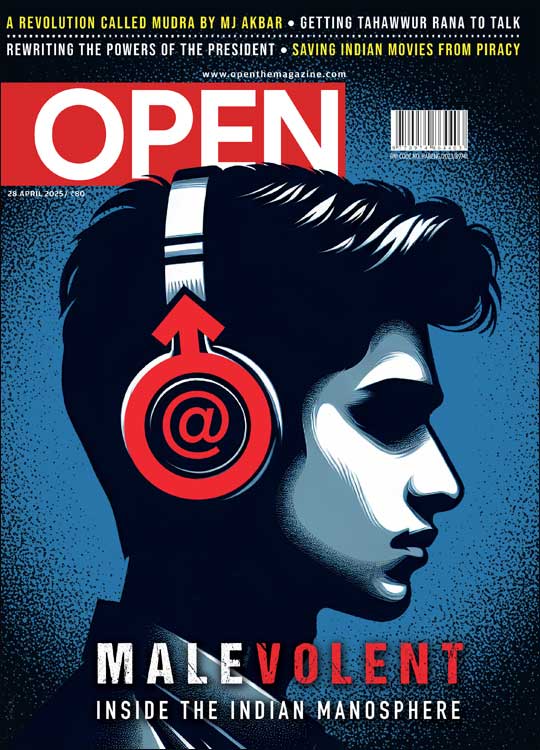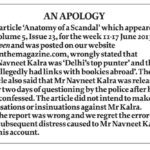So, Do You Need Modi?
The arrival of Arvind Kejriwal eliminates the need for the urban educated middle-class to negotiate a compromise with its own values
 Manu Joseph
Manu Joseph
 Manu Joseph
|
18 Dec, 2013
Manu Joseph
|
18 Dec, 2013
/wp-content/uploads/2015/11/ToC-Cover-Modi2.jpg)
The arrival of Arvind Kejriwal eliminates the need for the urban educated middle-class to negotiate a compromise with its own values
The Namo Power Pepper Spray comes with the image of a visibly potent Narendra Modi with his strident hand raised, index finger pointed. And his comment, ‘If women feel unsafe, we shouldn’t call ourselves ‘MARD’’ MARD, for the benefit of some South Indians, is a North Indian man in capital letters. The Namo Pepper Spray, with a discount of 60 per cent underwritten by Modi’s election campaign, is ‘easy and ready to use’ and can be used in various situations that include ‘Absence of male members in the house’ (and probably the presence of an assailant), and against ‘dog attacks’, and men in the ‘workplace’.
The pepper spray constituency would have normally laughed away a man who endorsed such a product, worse a man who is accused of being responsible for riots in which thousands died, or were maimed or destroyed in other ways. Yet, Modi is rising in stature among them, as he is among the rest of the refined educated urban class. They have set and are setting a case for him to be Prime Minister. He is rising among them because morality, at its very core, has the quality of an argument and practicality, of resolution.
The Namo Pepper Spray protects women from ‘Attackers, rapists, kidnappers’. The packaging of the spray has an elaborate list of situations it can be used in but does not mention a practical use—against thugs charging with swords and trishuls, too, during “spontaneous riots” to use Modi’s expression. Yet, the Namo Pepper Spray has important reasons not to be so ashamed of the word ‘riots’.
After all, the Special Investigation Team appointed by the Supreme Court has clearly said, after years of investigation perhaps, that there is ‘no evidence’ that Modi had anything to do with the riots in Gujarat over a decade ago.
Considering the mountain of undisputed facts, the evidence the Team was looking for was probably incontrovertible proof that Modi stood on a table and ordered his officers to facilitate riots. There is no such evidence, there will be no such evidence.
In 2002, Modi’s former home minister, the late Haren Pandya, who disliked Modi, told me in an interview on the condition that I did not name him, that he had deposed in secrecy before a tribunal and stated that there was a late-night meeting on 27 February that year, before the riots broke out, in which Modi had told senior government officers that they should not come in the way of a Hindu response to the Godhra carnage. But the details of that meeting have now become contentious. Three years ago, on the sidelines of an award function hosted by The Hindu, I met RK Raghavan, the chief of the Team, and I told him Pandya was not present at the midnight meeting.
Raghavan said, “He was not present?” It was a surprising statement from the head of the SIT because Pandya never claimed he had attended the meeting.
“You didn’t know that?”
“I didn’t know that,” Raghavan said. “Who told you that he was not present at the meeting?”
“He told me.”
“I am so relieved. My conscience is clear now.”
Whatever human conscience might be, its purpose is to get ‘clear’. The combination of this need for cleansing and the relentless force of practicality has resulted in a middle-class view that the co-founder of Infosys, NR Narayana Murthy, recently summarised: that Modi should be allowed “to show a sense of contrition” and “to move on”. “Otherwise,” he said, “we will argue on this till the fire freezes.” Penance and closure. Because Modi, to millions of Indians, appears to be a more useful leader than the sofa-cum-bed leadership of Sonia Gandhi and Rahul Gandhi. The perception is that Modi is tough, articulate and has ideas. Even though he is 63years old, and Rahul Gandhi 43, it is Modi who is perceived as the youth and Gandhi the relic.
But the sensational rise of Arvind Kejriwal and his Aam Aadmi Party, which has terrified both the Congress and Modi’s Bharatiya Janata Party (BJP), eliminates the need for millions of Indians to sacrifice their right to moral judgment for practical considerations. Kejriwal, even though he is attired in an odd cap as if he has lost a bet, and oversized shirt and trousers, is almost everything that Modi is believed to be without the stains. Also, what Delhi has shown is that in this season, clean is the new saffron.
The Economist, this week, sounded like a vast section of middle-class urban India when it wrote:
‘Much about Mr Modi appeals to this newspaper too. He is a man of action…’ But then, Kejriwal has proved to be that in a more exhilarating way this month.
‘…and an outspoken outsider in a political system stuffed with cronies.’ This sounds more like Kejriwal than Modi.
‘In contrast with the pampered Mr Gandhi… Mr Modi comes from a low caste and a modest background as a tea-seller; his success is down to drive and ambition. And in a system shot through with corruption, he seems pretty clean.’
This, again, but for a few details, is a better description of Kejriwal. From the oblivion of activism, he engineered a mass movement using an old man as a masquerade, broke away after gaining enough attention, stayed in the spotlight by feeding dramatic stories to journalists that shamed powerful people, stories that journalists could not have reported on their own because their organisations would not have allowed that. It is not odd that Mukesh Ambani sent legal notices not to Kejriwal but to several television channels, taking offence to the coverage of Kejriwal’s press conferences—Ambani’s counter attack was spot on.
Last year, at the Times of India literary festival where Kejriwal revealed the ‘Swiss bank’ account numbers of Anil and Mukesh Ambani, I met him in the speaker’s retiring room. I asked him how long, in his opinion, the media would give him play. Instead of trying to achieve an answer, he started asking me questions about how the media operates. He listens with such care that the speaker is often led to believe he is saying something extremely brilliant.
A few months after the encounter, when his game was up and most of the media had abandoned him, Kejriwal entered electoral politics, even stood in direct contest against the powerful former Chief Minister, Sheila Dikshit. He went to parts of Delhi that the government never reached in any substantial way. According to Open’s Mihir Srivastava, who spent several days on campaign with AAP candidates, Kejriwal, between the scores of daily meetings with the poorest of the poor, would eat in the car—fruits, vegetables and salt lassi, which was held in a large stainless steel container. One old villager who listened to Kejriwal said, “He is like us.” That is not true, but it is a triumph of perception.
Delhi is a city where the elite move from one island of reasonable comfort to another, where they do not walk the streets for reasons other than exercise, where an overwhelming majority of them do not take public transport, and where political observers are part of the elite. No surprise then that these observers completely dismissed him.
What Kejriwal would soon make near-obsolete was not only Delhi’s ancient style of politics but also political commentary.
Taxi-driver journalism, which is the spurious art of engaging such a driver in a casual conversation to convey a cute point of view, is a tired charade. But in the case of Kejriwal, reporters who did speak to taxi-drivers (and autorickshaw drivers) about the man did gain insights that were unavailable to television studios. Kejriwal eventually decimated the Congress, and on Monday will reveal if he wants to form the government in Delhi.
The Economist, like Modi’s new sophisticated urban fans, wrote that Modi needs, ‘to show that his idea of a pure India is no longer a wholly Hindu one’.
Kejriwal, on the other hand, has no need to ‘show’ such a thing. He has nothing to ‘show’, nothing to hide. Despite his frequent vows of silence, and these days a convenient but real sore throat, he has no reason to fall silent. Modi is silent on allegations of snooping into the life of a young woman, and on the misdemeanours of his industrialist friends and many other questions. Modi is silent on the legality of homosexuality. The RSS took its time to break its silence. (The Congress, meanwhile, in an insinuation that makes seasoned journalists smile, wonders why). The BJP has deemed homosexuality ‘Western culture’ and ‘unnatural’. Kejriwal and the Aam Aadmi Party are unambiguous about their position on homosexuality: ‘All those who are born with or choose a different sexual orientation would thus be placed at the mercy of the police. This not only violates the human rights of such individuals, but goes against the liberal values of our Constitution, and the spirit of our times.’
A similarity between Kejriwal and Modi exists, and it is odd—an affection for Baba Ramdev, probably the only man in the history of humanity who has appeared in woman’s clothing in full public glare to deem homosexuality ‘unnatural’ and even proffer a ‘cure’ for it. About Ramdev, Kejriwal told me in an interview, “He is also fighting against corruption… in his own way… I think I shouldn’t comment on any individual…”
Also, when compared to Modi, the crucial question is if Kejriwal, the amateur, can indeed govern. Moral indignation is good for mass movements and even election campaigning, but is useless in governing. He has not yet had a chance to prove himself as a ruler.
Also, there is another crucial question. Is he good for commerce? He has laughed away claims that he is a ‘socialist’, but the question remains.
“He is not against business.” This answer comes from Prashant Bhushan, for long a crusader against corruption in public life, the secret source of some of the greatest news stories of modern India, a vital member of the AAP and a man who by instinct is suspicious of the business community. Just as Indian cricket commentators cannot use the word ‘odious’ without the prefix ‘comparisons are’, Bhushan is hardwired to prefix ‘capitalism’ with ‘crony’. Not surprising then that the man sitting beside him in his Noida home is Binayak Sen, a sympathiser of Naxalites, who was atrociously jailed for sedition. When I ask Sen for his views on Kejriwal, he joins his palms and requests that he be asked nothing at all.
A few hours ago, the AAP’s core group and its new Members of the Legislative Assembly had met to decide if the party must accept the untrustworthy Congress’ offer of support to form the Delhi government. In an unprecedented but politically shrewd move, the party decided to ask its voters to give their opinions through text messages, phone calls and the internet. “Kejriwal is game,” Bhushan says, “He is fine with forming the government, but he wants to know if people share his view.”
Bhushan and Kejriwal are believers in what Bhushan calls “participative democracy”, where people’s views are sought not only for elections but for “policy matters too”. The reasoning is that India’s Constitution was influenced by, among other factors, the technology of those days. Now that people can relay their opinions more easily, their views can be taken more frequently. (Though, surely, Bhushan will be horrified if all of India is asked its opinion on Kashmir.) At the time of going to press, AAP reports that hundreds of thousands of people in Delhi have responded to the party’s question on whether it should form the government.
Bhushan is amused by the media coverage of Hazare’s fast and his support for the Lokpal bill, a bill that AAP and Kejriwal maintain is impotent as the institution it would create would be only a more famous version of the toothless Central Vigilance Committee. “Cosmetic Lokpal,” is what Bhushan calls it.
“Anna gets surrounded by all kinds of dishonest people,” Bhushan says, “He gets influenced easily. One of his advisors now is Santosh Bhartia, a known history-sheeter and a political fixer.” Bhushan says that Hazare has been played by major political parties to get his endorsement. In his bitterness against the success of Kejriwal and his haste to usurp credit for the Lokpal, he has “given his approval to a toothless bill.”
AAP is plotting its plans for the General Election next year. “Maybe 100 seats,” Bhushan says, “We may contest 100 seats, chiefly in urban areas. It is so tough, so tough to contest elections. A party can grow only over a period of time.” I argue that the only way AAP can grow is fast, hysterically, dramatically, like a ‘spontaneous riot’. “We do not rule that out,” Bhushan says, “We do not rule out the possibility that AAP will be more ambitious, but it is so tough. Running a political organisation is so difficult. Checking the backgrounds of people who are coming to you is so difficult.”
Compared to politics, he says there was something sweetly simple about mass protests. “But mass movements have limitations. The political and business classes are okay with some alms for the poor, they are alright with that, they even support that. But policy changes? That frightens them.” He says that the RTI (Right to Information movement, which Kejriwal and Bhushan were a part of, and which pressured the Government into enacting one of the most important legislations in modern India), “was possible because Sonia Gandhi had no clue. She had no clue how big the RTI was going to be, otherwise she would not have let that happen.”
He has no tender feelings towards her, but concedes that in comparison with Modi, “At least she, she and her son, they do not have fascist tendencies.”
Kejriwal is an equal match for Modi, he says. “Arvind’s political acumen is unmatched. He has this instinct, amazing instinct. He knows the pulse. He knows what to do. He knew the [broom] symbol was right, he knew the name was right. He chose them. He knows how to fight politicians. And he is not afraid.”
And, like Namo Pepper Spray, Kejriwal’s nozzle ‘always points towards the attacker’s face’.
This article was modified after it was published.
About The Author
CURRENT ISSUE
MOst Popular
3

/wp-content/uploads/2025/04/Cover-Manosphere.jpg)











More Columns
‘Colonialism Is a Kind of Theft,’ says Abdulrazak Gurnah Nandini Nair
Bill Aitken (1934 – 2025): Man of the Mountains Nandini Nair
The Pink Office Saumyaa Vohra